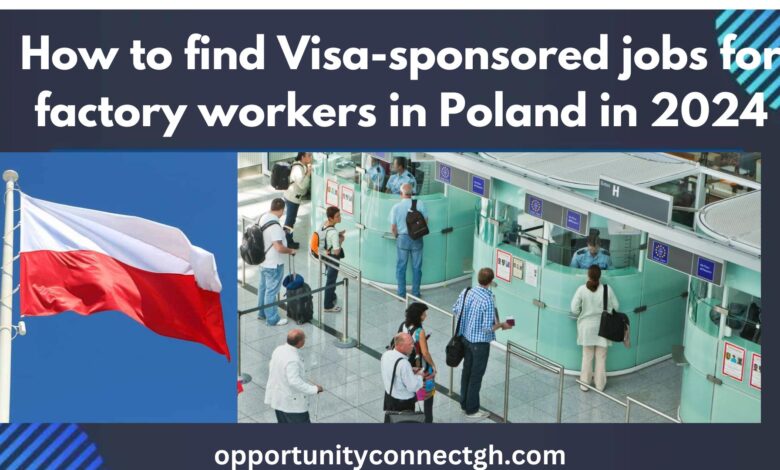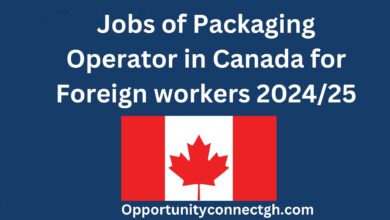Exploring Visa-Sponsored Jobs for Factory Workers in Poland in 2024

Introduction: Exploring Visa-Sponsored Jobs for Factory Workers in Poland in 2024
As we enter 2024, Poland’s industrial sector is experiencing a significant upsurge in demand for factory workers. This growth is fueled by the country’s expanding manufacturing base and the increasing integration of advanced technologies in production processes. The need for skilled and unskilled labour in factories across Poland is creating numerous employment opportunities, particularly for international workers.
The concept of visa-sponsored jobs is becoming increasingly vital in this context. For many aspiring workers from abroad, visa sponsorship is the key to accessing these emerging job opportunities in Poland’s factories. Visa-sponsored jobs offer a legal and secure pathway for international workers to join Poland’s workforce, contributing significantly to the country’s industrial growth.
In 2024, understanding the landscape of visa-sponsored jobs for factory workers in Poland will be crucial. These roles not only provide a stable source of income but also offer a chance for workers to experience life in a culturally rich and diverse country. The availability of visa-sponsored positions is making Poland an attractive destination for those seeking work in the manufacturing sector.
This article aims to delve into the opportunities and processes associated with securing visa-sponsored jobs for factory workers in Poland in 2024. From identifying job openings to understanding the legalities of work visas, we will provide a comprehensive guide for international workers looking to embark on a fruitful career journey in Poland’s thriving industrial landscape.
Understanding Visa Sponsorship for Factory Workers in Poland in 2024
Visa sponsorship is a critical component for international workers seeking employment in Poland, particularly for factory jobs in 2024. This process involves a Polish employer extending a formal offer of employment to a non-EU worker and subsequently taking responsibility for sponsoring their work visa. This sponsorship is essential as it signifies the employer’s commitment to support the visa application, ensuring that the prospective employee meets Poland’s immigration requirements.
The Essence of Visa Sponsorship
Employer’s Role: In visa sponsorship, the employer in Poland not only offers a job but also assists in navigating the visa process, which includes vouching for the worker’s qualifications and the legitimacy of the job offer.
Gateway to Legal Employment: Obtaining a sponsor is often the first step for international factory workers to work legally in Poland. It’s a mutually beneficial arrangement, providing workers access to job opportunities while helping employers fill labour shortages.
Work Visa Requirements and Eligibility for Factory Workers
Types of Work Visas: Poland offers various types of work visas, but the most common for factory workers is the National Visa (Type D) for employment purposes.
Eligibility Criteria: To be eligible, workers generally need a formal job offer from a Polish employer, relevant work experience or skills, and sometimes vocational qualifications.
Documentary Requirements: Applicants must provide a passport, a completed visa application form, a job contract or offer letter, proof of accommodation in Poland, and sometimes evidence of sufficient financial means.
Health Insurance Requirement: Applicants must also show they have or will have health insurance coverage in Poland.
In 2024, understanding the intricacies of visa sponsorship will be crucial for those seeking visa-sponsored jobs as factory workers in Poland. This process not only ensures compliance with Poland’s immigration laws but also offers a structured pathway for international workers to enter and contribute to the Polish economy. By meeting the specified requirements and collaborating with their sponsoring employers, workers can embark on a promising career journey in Poland’s manufacturing sector.
How to Find Visa-Sponsored Jobs for Factory Workers in Poland in 2024
Step-by-Step Guide to Locating Visa-Sponsored Jobs
Research the Polish Industrial Market: Begin by understanding the industrial sectors in Poland that are actively seeking factory workers. This includes sectors like automotive, electronics, and food processing.
Identify Potential Employers: Look for companies in Poland known for hiring international factory workers. Check their career pages for visa-sponsored job listings.
Utilise Online Job Portals: Platforms such as Pracuj.pl, Jobs.pl, and Indeed Poland often list factory jobs with visa sponsorship. Use filters to narrow down your search.
Engage with Recruitment Agencies: Connect with recruitment agencies specialising in industrial employment. They can help match your skills with appropriate visa-sponsored positions.
Attend Job Fairs and Networking Events: Look out for job fairs, either online or in-person, that focus on industrial employment in Poland. These can be great opportunities to connect directly with employers.
Top Resources for Job Listings
Industry-Specific Websites: Websites focused on Poland’s manufacturing sector often post job listings and information about visa sponsorship.
Social Media Channels: Follow relevant social media groups and forums that share information about job opportunities in Poland’s factories.
Polish Embassy and Consulates: They sometimes provide resources or information about working in Poland, including visa-sponsored roles.
Expatriate Networks: Connecting with expatriate communities in Poland can provide insider tips and leads on available factory jobs.
Applying for Visa-Sponsored Jobs
Prepare your application: Tailor your resume and cover letter to the Polish job market. Highlight any previous experience in factory work or relevant skills.
Understand Visa Requirements: Familiarise yourself with the work visa requirements for Poland. Ensure you meet the eligibility criteria before applying.
Apply and Follow Up: Submit your applications to the identified job openings. If possible, follow up with the employer or recruitment agency for updates on your application status.
Prepare for interviews: Be ready for remote or in-person interviews. Learn about the company and the specific role to make a good impression.
Finding visa-sponsored jobs for factory workers in Poland in 2024 involves a combination of thorough research, utilising various job-finding resources, and effectively presenting your skills and experience. By following these steps and leveraging the available resources, you can navigate the process of securing a visa-sponsored factory job in Poland, opening the door to new career opportunities in a growing industrial landscape.
Application Process for Visa Sponsorship: Factory Workers in Poland 2024
Navigating the visa sponsorship process for factory workers in Poland in 2024 involves several critical steps. This guide outlines the key stages, required documents, and expected processing times for obtaining a work visa in Poland.
Understanding the Visa Type
Identify the Correct Visa Category
For factory workers, the most common visa category is a National Work Visa (D-type), specifically for employment purposes.
Required Documents for Application
- Valid Passport: Your passport must be valid for at least three months beyond the duration of your intended stay in Poland.
- Job Offer Letter: A formal employment contract or job offer letter from a Polish employer is essential.
- Visa Application Form: Complete the application form accurately and truthfully.
- Photographs: Provide recent passport-sized photographs as per specification.
- Health Insurance: Proof of health insurance coverage for the duration of your stay in Poland.
Step-by-Step Application Process
- Receive a Job Offer: Secure a job offer from a Polish employer willing to sponsor your visa.
- Labour Market Test: Often, the employer needs to conduct a labour market test to justify hiring a foreign worker.
- Submission of Documents by Employer: Your employer in Poland may need to submit some documents to local authorities, such as the Voivodeship Office, on your behalf.
- Apply at the Consulate: File your visa application at the nearest Polish consulate or embassy in your home country.
- Document Verification: Submit all required documents and attend a visa interview, if necessary.
- Visa Processing: Wait for the processing of your visa application. During this period, the consulate reviews your application and makes a decision.
Processing Times and Fees
- Processing Time: The processing time can vary, typically taking from several weeks up to a few months.
- Visa Fees: Be prepared to pay the visa application fee, which varies but is usually around 60 to 100 EUR.
Finalising the Process
- Visa Approval: Once approved, collect your visa and prepare for your journey to Poland.
- Arrival in Poland: After arriving in Poland, you may need to complete additional formalities, such as registering your stay.
Successfully applying for a work visa as a factory worker in Poland in 2024 requires careful preparation, understanding the specific requirements, and patience through the processing period. Ensuring that all documentation is complete and accurate is crucial for a smooth visa application experience. By following these steps, you can embark on your journey to securing a visa-sponsored job in Poland’s manufacturing sector.
Life and Work in Poland for Factory Workers in 2024
For those considering visa-sponsored jobs as factory workers in Poland in 2024, understanding the working conditions, culture, and lifestyle in Poland is as crucial as the job itself. This section provides insights into what life and work entail in Poland for factory workers, covering aspects like working conditions, cost of living, accommodation, and community life.
Working Conditions in Polish Factories
- Work Hours and Environment: Factory workers in Poland typically encounter standard working hours, often in shifts. The work environment is regulated, adhering to safety and health standards.
- Labour Laws and Rights: Poland has strict labour laws protecting workers’ rights, including fair wages, regulated working hours, and necessary breaks.
- Culture in the Workplace: The work culture in Poland values punctuality, respect for hierarchy, and a strong work ethic.
Living in Poland: Cost of Living and Accommodation
- Cost of Living: Poland is known for its relatively low cost of living compared to other European countries. Expenses such as food, transportation, and leisure activities are reasonably priced.
- Accommodation Options: Factory workers can find a range of accommodation options, from apartments in urban areas to more affordable housing in suburban regions. Renting is common, and prices vary depending on location and size.
- Utilities and Expenses: Utilities like electricity, heating, and the internet are additional costs. These are generally affordable, but they are important to factor into your budget.
Embracing the Polish Lifestyle and Community
- Cultural Integration: Immersing in the Polish culture involves understanding local customs and traditions and potentially learning the basics of the Polish language.
- Community Life: Poland offers a vibrant community life with various cultural, historical, and recreational activities. Expatriates often find it easy to integrate and connect with local communities and other expats.
- Access to Healthcare and Education: Poland provides quality healthcare and education that are accessible to residents, including expatriates working in the country.
Life and work in Poland for factory workers in 2024 present a balanced blend of rewarding work opportunities and a fulfilling lifestyle. With reasonable living costs, a supportive community, and a rich cultural backdrop, Poland stands out as an attractive destination for those seeking visa-sponsored factory jobs. As the global job market evolves, Poland continues to be a welcoming place for international workers looking to build a new life and career.
Legal Rights and Responsibilities for Visa-Sponsored Factory Workers in Poland in 2024
Understanding the legal framework surrounding visa-sponsored jobs is crucial for factory workers in Poland. This section outlines the key rights and responsibilities that come with such positions in 2024.
Legal Rights of Factory Workers
- Work Conditions and Pay: Workers are entitled to fair working conditions and wages as stipulated in their employment contracts, in line with Polish labour laws.
- Health and Safety: Employers must ensure a safe working environment by adhering to health and safety regulations.
- Non-Discrimination Policy: Workers are protected under Polish law from discrimination based on nationality, race, gender, or religion.
Responsibilities and Obligations
- Adhering to Visa Terms: Workers must comply with the specific conditions of their work visa, including restrictions on employment and the duration of their stay.
- Tax Obligations: As legal employees, factory workers are responsible for understanding and fulfilling their tax obligations in Poland.
- Respecting Local Laws: Workers should familiarise themselves with and respect Polish laws and customs.
FAQs: Visa-Sponsored Factory Jobs in Poland
1. How do I find a visa-sponsored factory job in Poland?
Start by researching online job portals, contacting recruitment agencies, and exploring company websites that are known to sponsor visas for international workers.
2. What are the requirements for obtaining a work visa in Poland?
Typically, a valid job offer from a Polish employer, relevant qualifications or work experience, and meeting health and character requirements are necessary.
3. How long does it take to process a work visa for Poland?
Visa processing times can vary, but it generally takes several weeks to a few months.
4. Can I bring my family with me to Poland on a work visa?
Depending on the type of visa, you may be able to bring dependents. Check the specific provisions of your work visa.
5. Is it necessary to speak Polish to work in a factory in Poland?
While not always mandatory, knowing basic Polish can be beneficial for communication and integration into the community.
6. What happens if my work contract in Poland ends?
Your right to stay in Poland is typically tied to your employment, so if your work contract ends, you may need to leave the country or find another job to maintain your legal status.
Understanding your legal rights and responsibilities as a factory worker in Poland is essential for a successful and trouble-free employment experience. Being informed and prepared can help you navigate the process of obtaining and maintaining visa-sponsored employment in Poland in 2024.
People also read:
15,000 Visa-Sponsored Jobs in Sweden for International Travellers in 2024
Scholarships for Ghanaian students in Swedish Universities 2024
Scholarships to Study in Canada in 2024
Scholarship Opportunities for Nigerian Students to study in the UK in 2024
Specialised Scholarships for Ghanaian students to Study in Canada 2024
Scholarships in Canada for International Students 2024-2025
MBA Scholarship Opportunities in the Netherlands, 2024-2025
Unique PhD Programmes at the UDS 2024




